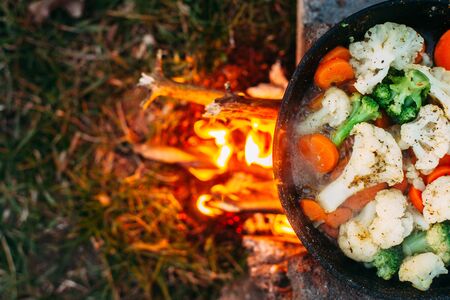Introduction to Campfire Classics
There’s something truly special about enjoying classic British fare whilst camping in the great outdoors. Whether it’s sizzling sausages, a hearty pork pie, or a wedge of crumbly cheese, these favourites are woven into the fabric of our culinary traditions. They’re not just food—they’re part of what makes a British camping trip uniquely comforting. However, taking these cherished treats away from the kitchen and into nature calls for careful thought and proper handling. After all, maintaining their taste and safety is as much about honouring tradition as it is about satisfying hunger. With each bite around the campfire, we celebrate both heritage and flavour—making it all the more important to store them right so that every mouthful lives up to its legacy.
2. Understanding British Weather and Its Impact
One of the most distinctive features of camping in the UK is learning to adapt to its famously unpredictable weather. Whether you’re pitching a tent in the Lake District or setting up near a Cornish beach, the ever-changing conditions can make storing your favourite British foods—sausages, pies, and cheese—a unique challenge. Temperature swings, persistent humidity, and surprise showers all play a part in how well your food keeps during your outdoor adventure.
First, let’s consider temperature. Unlike consistently hot climates, UK summers can be mild one day and surprisingly warm the next. Sudden drops at night are common too. This fluctuation means that perishable items like sausages and soft cheeses are at risk of spoiling if left unchecked. Humidity is another factor; high moisture in the air encourages mould growth on cheese and can make pie crusts soggy. On top of this, there’s always the possibility of an unexpected downpour soaking tents or cool bags, further complicating storage solutions.
Below is a quick reference table outlining how typical UK weather variables affect popular British camping staples:
| Weather Factor | Sausages | Pies | Cheese |
|---|---|---|---|
| Temperature Fluctuations | Can cause spoilage if not kept cool; fat may separate. | Filling may go off; pastry can become greasy. | Soft cheeses especially vulnerable to melting/spoilage. |
| Humidity | Casing may split; texture changes possible. | Pastry becomes soggy; risk of mould on fillings. | Mould growth on rinds; sweating in waxed cheeses. |
| Unexpected Showers | Packaging may get wet, leading to contamination risks. | Pies may absorb moisture; lose crispness. | Cheese wrappers can soak through; contamination/mould risk increases. |
Understanding these variables is crucial when planning meals and choosing storage methods for your camping trip. By anticipating what the British climate might throw at you, you’ll be better prepared to keep your treasured sausages, pies, and cheese in tip-top condition throughout your stay outdoors.

3. Smart Packing: Essential Storage Gear
When it comes to keeping British favourites like sausages, pies, and cheese fresh during your camping adventure, smart packing is key. Investing in the right storage gear not only preserves taste and safety but also makes mealtimes more enjoyable in the great outdoors.
Cool Bags: Keeping Chilled Goods Fresh
Start with a high-quality cool bag. Brands such as Outwell, Vango, and Trespass are widely stocked across the UK and known for their robust insulation properties. Look for models with thick padding and reliable zips to keep temperatures low for longer. For family trips or longer stays, consider electric cool boxes that can be powered via car adapters—these are available at retailers like Halfords, Go Outdoors, and even larger supermarkets.
Ice Packs: The Unsung Heroes
No cool bag is complete without a supply of ice packs. Gel-filled blocks from trusted names like Lakeland or Sainsbury’s Basics range are affordable and effective. Freeze them overnight at home and layer them strategically around your perishables. If you’re camping in remote areas, reusable ice packs are especially practical since they minimise waste and can be refrozen when you return to a site with freezer access.
Sturdy Containers: Protecting Pies and Cheese
Pies and cheeses deserve extra protection from knocks and bumps on the journey. Seek out airtight plastic or stainless steel containers—LocknLock and Sistema are reliable choices easily found in Wilko, John Lewis, or Asda. These containers prevent cross-contamination, keep crumbs at bay, and help maintain humidity levels for cheeses so they don’t dry out or absorb unwanted odours.
Sourcing Your Supplies Locally
The good news is that all these essential items can be sourced from British high street retailers or online stores. For a one-stop shop before your trip, try Argos for storage solutions or Decathlon for specialist camping kit. Shopping locally not only supports UK businesses but also ensures you’re using products designed for British weather conditions—a crucial consideration when safeguarding our beloved sausages, pies, and cheese on any camping escape.
4. Keeping Sausages and Pies Safe
When it comes to a proper British camping experience, few things feel as comforting as tucking into fresh sausages or a classic pork pie after a day in the outdoors. However, these beloved staples are highly perishable, so keeping them safe from spoilage is paramount. Below are some practical tips and steps for transporting and storing these favourites while ensuring their quality and safety.
Transporting Fresh Sausages and Pork Pies
Fresh sausages and pork pies require particular care during transportation, especially if your campsite is far from home or the nearest shop. Always use a reliable cool bag with ice packs to maintain a consistent low temperature. If you’re travelling for several hours, consider frozen gel packs rather than loose ice to prevent water from seeping into packaging.
Recommended Storage Temperatures
| Food Item | Optimal Temperature | Maximum Safe Duration (unrefrigerated) |
|---|---|---|
| Fresh Sausages | Below 5°C | < 1 hour |
| Pork Pies | Below 5°C | < 2 hours (if pre-chilled) |
Practical Steps for Camp Storage
- Clever Packing: Place sausages and pies at the centre of your cool box, surrounded by other chilled items for insulation. Keep the lid closed as much as possible to retain cold air.
- Layered Wrapping: Wrap sausages in greaseproof paper or foil before putting them in an airtight container. For pork pies, keep them in their original packaging or wrap tightly in cling film.
- Keep Separate: Avoid cross-contamination by separating raw sausages from ready-to-eat foods like pies. Use different containers if possible.
- Avoid Direct Sunlight: Store your cool bag or box in a shaded spot at camp and keep it off warm surfaces such as car boots or tent floors exposed to sunlight.
- Eat Promptly: Plan meals so that sausages and pies are eaten within the first 24-48 hours of your trip, especially during warmer months.
A Final Word on Food Safety
If there’s ever doubt about the freshness of your sausages or pies—such as unpleasant odour, slimy texture, or discolouration—it’s best to err on the side of caution and dispose of them. Nothing spoils a camping trip like an upset stomach. By following these storage practices, you’ll enjoy your favourite British bites safely under the stars.
5. Preserving British Cheese Al Fresco
When it comes to camping, cheese is a stalwart of the British picnic basket, but it’s notoriously sensitive to heat and humidity. Selecting the right types of cheese and storing them correctly ensures your Stilton, Cheddar, or Red Leicester remains safe and delicious during your countryside adventure.
Choosing Cheeses That Can Handle the Outdoors
Not all cheeses are created equal for alfresco eating. Harder cheeses like mature Cheddar, Double Gloucester, and Lancashire fare best in variable conditions. These varieties have lower moisture content, which means they’re less likely to spoil or go sweaty quickly. Soft and fresh cheeses—think Brie or cream cheese—tend to be more vulnerable to temperature swings, so keep those for shorter trips or days when you can guarantee refrigeration.
Wrapping Techniques: Tradition Meets Practicality
How you wrap your cheese makes a world of difference. Avoid cling film; it traps moisture and can encourage mould growth. Instead, wrap each wedge in waxed paper or baking parchment to allow the cheese to breathe, then pop them into a loose-fitting food bag or a reusable beeswax wrap for an eco-friendly touch. If you’re transporting multiple kinds, keep them separated to preserve their individual flavours and prevent cross-contamination.
Maintaining Optimum Conditions
The great British weather can be unpredictable, so keeping cheese cool is key. Store your cheese in the coolest part of your rucksack or cool bag, ideally nestled next to other chilled items (but not directly against ice packs, as freezing can ruin texture). When you arrive at your site, seek out a shady spot—under a tree or inside the tent porch—to stash your provisions away from direct sunlight.
Field-Tested Tips for Cheese Lovers
If you’re on an extended trip without access to refrigeration, consider portioning cheese into smaller pieces and only taking out what you need each day. A quick wipe with kitchen roll can remove any surface oiliness caused by warm weather. And remember: while a bit of surface sweating is normal, any strong ammonia smells or excessive mould mean it’s time to say goodbye.
With thoughtful selection and care, enjoying a slice of real British cheese in the wild can be just as satisfying—and safe—as tucking in at home.
6. Waste Not, Want Not: Leftovers and Food Hygiene
Camping in the UK is a cherished tradition, and enjoying classic British fare such as sausages, pies, and cheese is part of the experience. However, with limited storage options, it’s crucial to approach leftovers and food hygiene responsibly to minimise both waste and environmental impact.
Respecting Your Campsite
Always clear away all food remnants after meals. Never leave sausages, pie crusts, or cheese rinds out overnight; they attract wildlife and can disrupt local ecosystems. Use resealable containers or eco-friendly wraps to keep any leftovers safe from pests and the elements. If refrigeration isn’t available, assess what can realistically be kept until the next meal—when in doubt, err on the side of caution.
Storing Leftovers Safely
British weather can be unpredictable, but even cool evenings won’t reliably preserve perishable foods. Store cooked sausages or sliced pies in insulated cool bags with ice packs whenever possible. Cheese tends to fare better, especially hard varieties like Cheddar or Red Leicester, but should still be protected from direct sunlight and moisture to avoid spoilage or attracting insects.
Disposal: Leaving No Trace
If leftovers cannot be safely consumed later, dispose of them responsibly. Bring biodegradable rubbish bags and make use of designated bins at your campsite. Never bury food scraps or throw them into hedgerows; this can harm local wildlife and contravenes the Countryside Code.
Practising Good Food Hygiene
Wash your hands before handling food and after clearing up. Use separate utensils for raw and cooked items to prevent cross-contamination—especially important when dealing with sausages and meats. Wipe down surfaces regularly using antibacterial wipes or hot water if available.
Minimising Waste: Plan Ahead
The best way to reduce food waste is careful planning: pack only what you’ll realistically eat, opt for long-life versions of favourites where possible (like vacuum-packed pies or hard cheeses), and share surplus with fellow campers if appropriate. By embracing these habits, you’ll safeguard beloved British classics while protecting the beautiful countryside for future generations.

